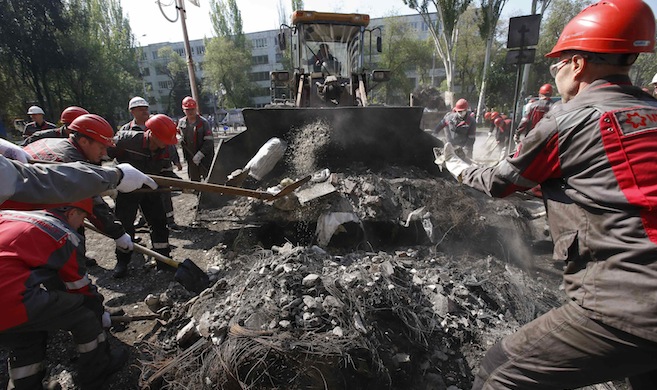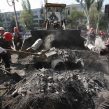
Secessionists on Collision Course With Akhmetov in Donbas
Publication: Eurasia Daily Monitor Volume: 11 Issue: 96
By:

Ukraine’s wealthiest industrialist, Donetsk-based Renat Akhmetov, on May 20, urged the workers of Donbas to protest against “those who call themselves some kind of people’s republic of Donetsk [secessionist leaders].” In a televised address via the Ukrayina channel, Akhmetov declared that the region’s population “can no longer live under terror.” He continued, “Those gunmen roaming the towns of Donbas—do they represent the Donbas people’s rights vis-à-vis the central authorities? No, they fight against Donbas, for the destruction of Donbas. I shall not allow them to destroy Donbas.” Akhmetov called on his and other enterprises in the region to stage protest rallies at their work places at 12 noon on every working day, from May 21 onward. He termed this move a “warning” to the destructive forces (video address via UNIAN, May 20).
Akhmetov’s tone in delivering the address combined indignation with self-assurance. In line with his cognomen as “King of Donbas” he invoked the pronoun “I” repeatedly and emphatically in his address. He stopped short of alluding to Russia’s sponsorship of those who would “destroy Donbas.” He refrained from mentioning his leadership role in the Party of Regions. And he omitted references to the Ukrainian government, parliament, or even the presidential election scheduled for May 25. His address rose above politics to maximize the resonance of his appeal. Although Akhmetov is still a power broker in Kyiv, he is betting heavily on a sense of Donbas local pride.
From the outset of pro-Russia agitations in Donbas two months ago, publicists in far-away Kyiv speculated about Akhmetov’s position. His anti-“oligarch” detractors suspected Akhmetov of colluding with the insurgents in order to enhance his own bargaining power vis-à-vis the central government. Others exaggerated in the opposite direction, believing him influential enough to save Donbas for Ukraine.
In fact, Akhmetov’s public statements left no doubt about his commitment to the country’s unity as against “federalization” (his motto: “Donbas in a united Ukraine”). All along, he backed Kyiv’s appointee, Serhiy Taruta, as governor of Donetsk province. The industrial enterprises under Akhmetov’s control—Systems Capital Management (SCM) holding which, in turn, owns more than 70 percent of the Metinvest holding, with a combined workforce of more than 200,000—did not allow the May 11 secession “referendums” to be held on their premises.
However, the central government’s default in Donbas undermined politically the supporters of Ukraine’s unity and left them unprotected to face the armed secessionists. The entire infrastructure of Donbas (on which industrial activity depends) is vulnerable to sabotage by the insurgents. Threats to the infrastructure and incidents of sabotage started occurring from the second week of May onward. The government’s anti-terrorist operation is seen as ineffective, leading to more fighting and destruction, with little apparent success as yet. When the fighting spread to Mariupol, a city of nearly 500,000, home to Metinvest’s Azovstal and Iliych steelworks, Akhmetov called for a local ceasefire between government and rebel forces.
On May 9, government troops had attempted in vain to oust rebels from downtown Mariupol. The inconclusive fighting had turned the city into a no-man’s land, where the police collapsed and criminality exploded (a situation increasingly common in Donbas). From May 11 onward, the Azovstal and Iliych managements organized patrols of unarmed workers to maintain order alongside the police, in and around Mariupol. Formally, the police requested and governor Taruta approved the arrangement; but no one doubted that Akhmetov was behind it.
On May 15 the Azovstal and Iliych CEOs, along with Mariupol’s lawful mayor and lawful police chief, the state-approved unions of veterans, youth, and women, and “the leader of [Mariupol] supporters of the Donetsk people’s republic,” signed a memorandum “on order and safety.” It stipulated an end to all fighting, removal of barricades and roadblocks in the city and its vicinity, joint patrolling by Metinvest workers and police, complete renunciation of violence, and all unlawfully held arms to be handed over to the police. According to Metinvest’s press office, this model, first tested in Mariupol, is potentially applicable to other towns where Metinvest plants employ tens of thousands of workers (Ukrainian State TV, Channel Five TV, Metinvest press releases, May 11, 15; Kyiv Post, May 16; RFE/RL, May 17).
In a videotaped address, released on May 14 in response to the secession “referendums,” Akhmetov warned that seceding from Ukraine and/or joining Russia would result in international isolation and sanctions, triggering the collapse of Donbas’s steel, machine-building, and chemical industries. Calling for a “de-centralization of government [as does the government in Kyiv],” he concluded that “Donbas can only prosper in a united Ukraine" (TRK Ukraine Channel via Kyiv Post, May 14).
On May 19, the Azovstal and Iliych CEOs announced that the actions of unlawful armed groups are disrupting production, jeopardizing the plants’ fulfillment of contract obligations, and inflicting financial losses on the industry. Endorsing Akhmetov’s appeal, the CEOs jointly declared that “the industry’s development is only possible in a united Ukraine” (UNIAN, May 19).
Both managements mobilized some 30,000 employees (about one third of their combined work force) for an anti-separatism, anti-terrorism march in downtown Mariupol, without flags or political slogans, on May 19. That morning, however, “Donetsk People’s Republic” fighters returned to Mariupol (breaching the May 15 memorandum) and deployed machine guns, forcing Metinvest to cancel the march for fear of risking employees’ lives (Ukraiynska Pravda, May 19; Channel Five TV, May 20).
“Voice of Donbas” rallies were held on the premises of Akhmetov-controlled metallurgical and mining enterprises, as well as other locations, in the Donetsk and Luhansk provinces, at noon on May 20. The watchwords were “for a Donbas without guns and gunmen,” “peace and order,” disarmament of unlawful armed groups, release of hostages and evacuation of illegally occupied buildings, unblocking of transportation arteries, as well as “gunmen’s departure from our towns” (Interfax-Ukraine, UNIAN, biz.liga.net, May 20, 21).
In a televised message to participants after the event, Akhmetov termed the rebels as “vagabonds [prokhodimtsy] terrorizing the Donbas, holding it hostage”; and for the first time he asked obliquely where did they come from and who paid them. Akhmetov predicted that the “Voice of Donbas” will resound more loudly, with noon-time protests to be held on a daily basis “until the rebels are pushed out of Donbas” (ukrstream.tv, May 21).




